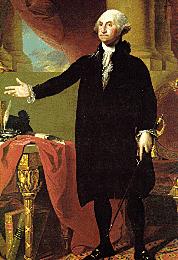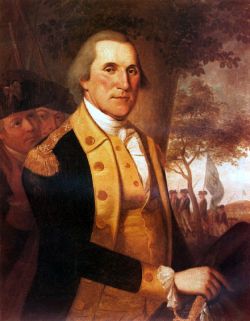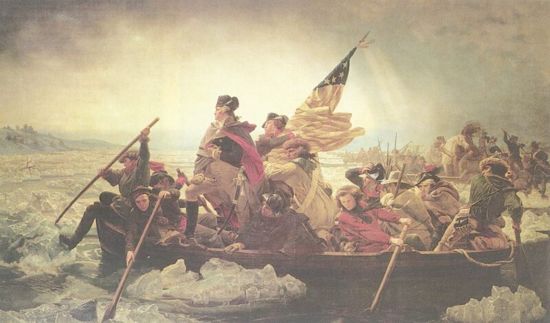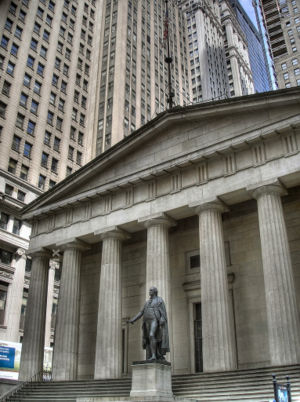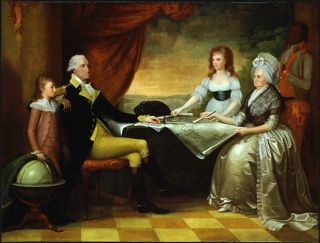George Washington
George Washington (1732-1799) was the commander in chief of the Continental Army and the first President of the United States (1789-1797). He was the dominant military and political leader of the new United States of America from 1775-1797, leading the American victory over the United Kingdom in the American Revolution and being a unanimous choice to serve as president. Along with Abraham Lincoln, he has become the foremost icon of American nationalism and a model of ideal republican political and military leadership.
Early Life
Washington was born on Feb. 22, 1732, at Wakefield, Virginia to Augustine Washington, a wealthy planter, and his second wife, Mary Ball. He was home schooled by his father and older half-brother Lawrence, and in later life read widely. His interests were in land, in surveying, and in farming. His father died in 1743, and George lived with Lawrence. Lawrence died in 1752. Washington inherited the plantation and joined the local upper class.
Military experience
In 1748 he joined an expedition sent out by the sixth Lord Fairfax to survey his lands in the Shenandoah Valley. Washington was eager for a military career. The first step came in October 1753 when the lieutenant governor Robert Dinwiddie sent him to warn the French at Presque Isle (now Erie, PA.) and Fort Le Boeuf (now Waterford, PA) against making further encroachments on British-claimed territory in the Ohio Valley. The 11-week journey, some 500 miles (800 km) round-trip, was dangerous, as Washington evaded hostile Indians (allied to the French). He reported back that a frontier conflict was imminent with France.
In April 1754 Washington returned to the Ohio country as lieutenant colonel in command of a volunteer force with the mission of checking the French and protecting an expedition sent out by the Ohio Company of Virginia to build a fort on the Ohio River, at what is now Pittsburgh. Washington discovered the French had reached the site first. They called it Fort Duquesne. In May he fired on a party of French soldiers, killing ten, including their leader, Jumonville. The French now could cite the attack on Jumonville as a cause of war. This was Washington's first battle and the first engagement of the French and Indian War.
On July 3 at Fort Necessity he was attacked by superior French forces led by Jumonville's brother and was compelled to surrender. The terms offered were generous and Washington returned to Virginia. Washington was criticized for his imprudence, and relations cooled between him and Dinwiddie.
To meet the French threat the British sent Maj. Gen. Edward Braddock and two under-strength regiments of British regulars to Virginia. Washington served as aide-de-camp to Braddock on his expedition to capture Fort Duquesne. Braddock was ambushed and killed by the French and Indians in July; Washington displayed courage and initiative in halting the rout that followed.
In August 1755 he was promoted to colonel and made commander in chief of all Virginia forces, responsible for the defense of a 350-mile (560-km) frontier against French and Indian attack. It was a difficult challenge militarily, but Washington met it and learned the administrative needs of commanding a major force. He was on the defensive throughout 1756 and 1757, but in 1758 he accompanied Brig. Gen. John Forbes and a large force to attack Fort Duquesne. They discovered the French had left and there was no combat. Washington returned to Virginia and resigned his commission at the end of 1758. For him, as for Virginia, the French and Indian War was over. He had been bloodied in combat, was an acknowledged leader of Virginia soldiers, knew the frontier better than anyone, and had a sterling reputation. On the other hand he had demonstrated no remarkable strategic or tactical skills, and had displayed rashness in action against Jumonville. Washington, a very tall strong man, demonstrated great physical courage and endurance, qualities much admired in a military leader.
Ellis (2004) concludes Washington was influenced by the East, where he picked up the deferential world of British patronage and hierarchy and curried favor from the well-connected Fairfax family, but failed to get a permanent commission in the British army. From the West came experiences on the Ohio frontier, where Washington carried out surveying expeditions and military campaigns against the French and Indians. Going to war instead of to college, Ellis concludes, scarred and immunized Washington against idealism.
Planter and family life
On Jan. 6, 1759, Washington married Martha Dandridge Custis, a widow with two children. Washington had no children of his own, but he later adopted two of his wife's grandchildren: George Washington Parke Custis and Eleanor Custis, who married Washington's nephew Lawrence. The marriage was a comfortably happy one. It made him rich, for the Custis plantation covered some 17,000 acres and included 300 slaves and a town house in Williamsburg. Washington proved himself an able and active manager, with a keen interest in scientific agriculture and land speculation. He bought up unoccupied western lands shrewdly, even in advance of permission from London. Unlike most planters, he foresaw the risks involved in a concentration on tobacco and diversified his crops. He grew wheat as well as tobacco on his Potomac farms, and by 1772 he was exporting both fish and flour to the West Indies. By 1774 he was one of the wealthiest of landowners at a time when ownership of land involved the administration of managers, overseers, tenants, and slaves; the keeping of accounts with the tobacco factors in the United Kingdom; and the ordering from England of most tools, furniture and clothing.
The local gentry controlled local government. Washington became a vestryman (in charge of the local Anglican church) and a justice of the peace. From 1758 to 1765 he was a member of the Virginia House of Burgesses for Frederick County, and from 1765 for Fairfax, although he took little part in affairs in Williamsburg. He was not a debater, speaker or pamphleteer, but nevertheless struck a conspicuous figure as a man of sound military, political and economic judgment. He had shown particular concern over bounty land due to the veterans of the French and Indian War, and he knew the Virginia frontier at first hand. Washington was America's first great entrepreneur, who saw the future of a diversified economy even in the South and achieved it for himself at least; who saw the future of the West and invested in it; and who directed all his activities with a careful and rather cold efficiency.
American Revolution
Washington's path to revolution reflected the American ideology of republicanism; indeed, it provides "an almost textbook example of the Radical Whig ideology that historians have made the central feature of scholarship on the American Revolution for the past forty years."[1] Personal experiences on multiple levels convinced Washington there was indeed a British conspiracy to enslave the colonies, as he saw imperial policies constantly limiting and restricting his prized autonomy. In his quests for a commission in the Redcoat army, for western land, and for economic independence from British consignment merchants, Washington found himself losing out, becoming a helpless dependent.
Washington and the Continental Army triumphed by driving the 10,000 British out of Boston in March 1776. The tide turned; Washington barely survived humiliating defeats the defense of New York City that fall. He revived the nation's fortunes in stunning victories at Trenton and Princeton over the winter of 1776-77. In 1777 he tricked the British into dividing their forces so that one British confronted (and defeated) Washington in unimportant battles near Philadelphia, while the main British army was forced to surrender at Saratoga, in upstate New York. This great American victory enabling the French to enter the war and make it an even contest militarily.
As Ellis (2004) argues, the June 1775-March 1776 siege of Boston was the formative event in Washington's development as a military and political leader, for it was there that he first responded to the logistical problems inherent to the American cause in the Revolutionary War with his trademark determination, leadership ability, and sound decision making. He also, however, exhibited a stubborn, aloof, severe personality that "virtually precluded intimacy." Washington, dubbed "His Excellency" by the adoring American public, also became acquainted with many of his future staff members and lieutenants during this period. The British were forced out of Boston and every place in America, which declared its independence and became "the United States of America" on July 4, 1776.
King George III personally demanded the rebellion be suppressed. He sent two-thirds of his army, and half of the Royal Navy in "the largest projection of seaborne power ever attempted by a European power."[2] The British sent 23,000 regular troops under experienced officers and sergeants, and another 10,000 trained Hessians (hired Germans) supported by 70 warships. The ocean off the entire Atlantic coast came under British control, shutting down the large American merchant marine. In the face of this, Washington's forces melted away. He had more than 28,000 men under his command at the end of August when the British landed. After losing badly in New York City, at the beginning of December he had a mere 6,800. But he used them in an audacious Christmas-day attack that destroyed the Hessian garrison at Trenton, New Jersey [3] and defeated the British outpost at Princeton, New Jersey. Threatened by Washington and harassed by patriotic farmer-marksmen, the British withdrew from the state of New Jersey.
When the British moved in fall 1777 to capture the national capital at Philadelphia, Washington moved south to stop them, but was defeated at Brandywine (Sept 11) and Germantown (Oct 4). The British wintered in comfort in the city while Washington's army, 11,000 strong at first, had stark quarters at Valley Forge nearby. "The whole of them," said Gen. John Sullivan, were "without watch coats, one half without blankets, and more than one third without shoes . . . many of them without jackets...and not a few without shirts." Rations were scarce, as the local farmers refused to accept Continental money. Exhausted and ill, hundreds deserted to go home to their farms. Washington warned Congress: "unless some great and capital change suddenly takes place... this army must inevitably...starve, dissolve or disperse." Many in Congress grumbled about Washington's leadership and there was talk of promoting his chief critic, General Thomas Conway. However Congress and the army realized Washington was indispensable, and he remained in charge. The bright note was that Washington brought in a highly skilled European officer, General Friedrich von Steuben, who systematically trained the officers and sergeants in the latest drills and maneuvering techniques of the Prussian army.[4]
The British made one last major effort in 1780-81, invading South Carolina (and remote Georgia) in the hopes of rallying enough Loyalists to break off the southern states. Washington kept the main British army bottled up in New York City, as the southern campaigns turned into guerrilla warfare and assassination squads. The British realized they had failed and moved their army to Yorktown, Virginia, awaiting the Royal Navy to take it to New York. The British fleet did show up but was defeated by a stronger French fleet. Washington meanwhile moved his entire army and the French army to Yorktown, where they forced the British to surrender in October 1781. King George III wanted to fight on even after losing two of his three combat armies but he lost control of Parliament and the American war was over. When the peace treaty was finalized in 1783, Washington triumphantly marched into New York City. Then to the astonishment of the world, Washington--by now the most famous man in the world, disbanded his army and went home to his plantation, setting a standard of republican belief in the civilian supremacy.
Constitution
Long before most of his contemporaries, Washington realized that independence could not be guaranteed without a standing army and that a nation strong enough to defend itself and to control the West could not exist without a central taxing power and a competent executive authority. All of those things, he admitted. ran directly counter to anti-tax, anti-centralizing sentiments that animated the Revolution. But they were necessary nonetheless, Washington insisted throughout the 1780s. Ellis (2004) concludes that Washington, succeeded in reconciling those contradictions and playing the difficult role of a semi-monarchical republican leader because he understood so well the proper use of power and could project "onto the national screen ... the same kind of controlling authority he had orchestrated within his own personality."[5]
First President
Washington entered the presidency with the overwhelming support of every group in the nation, thus allowing him great freedom in setting up the customs, honors and daily functioning of the new government. Washington surrounded himself with a sophisticated and intelligent group of consultants and supporters and successfully delegated most of the responsibility for the conduct of their offices to those trusted colleagues. He practiced "leading by listening"[6].
As President Washington employed careful restraint in exercising executive power (to prevent a backlash against centralization), and practiced calculated postponement of potentially lethal issues such as foreign war or ending slavery. His was restrained regarding such issues as the power of the Supreme Court and the abolition of slavery (he quietly favored gradual emancipation), and his absence from early pronouncements in favor of Hamilton's financial plans, allowed him to develop both a nation and an office that appeared above the day-to-day political battles. However, he played a leading role in the struggle to locate the permanent national capital in D.C. and in making foreign policy. He believed America's future interests did not depend on Europe but on the people and lands to the nation's west. Washington's vision led to a restrained but effective use of the power of the executive office and the foundations for a strong national government.[7]
Creating a republican government
Hamiltonian policies
Whiskey Rebellion, 1794
French Revolution
Washington had not traveled outside the U.S. (apart from a brief visit to Bermuda), and paid little attention to European affairs. When the French Revolution led to war in 1793 between the United Kingdom (America's leading trading partner), and France (the old ally, with a treaty still in effect), Washington and his cabinet decided on a policy of neutrality.
Retirement and return: 1797-99
Family and personality
As Henriques (2006) stresses, Washington was driven by a lifelong quest for fame. He zealously guarded his reputation and took great care to ensure that he always acted properly and that he received due acknowledgment for his propriety. Washington prided himself on his honorable actions and was inordinately sensitive to criticism. Ellis (2004) stresses that Washington learned to discipline his emotions as an essential survival skill while facing dangers as a young officer in the Seven Year's War. That capacity for self-control, outwardly manifested in his famous aloofness, served Washington well again during the Revolution, not only by insulating him from criticism, but also by enabling him to curb his ambitions sufficiently to give up power at the end of the war. This earned him the universally honorable reputation that he so ardently desired.
Washington died in 1799 from acute epiglottitis during an influenza epidemic. Attending physicians could not agree whether his condition was cynanche, an inflammation of the throat that was believed to require powerful remedies, or something that would require less radical therapeutic interventions than those his physicians had prescribed.[8]
Slavery
Critics argue that Washington's status as a slaveholder, his treatment of his slaves, and his condoning of the institution of slavery besmirch his reputation as the "father of our country." Washington's stay at the President's House in Philadelphia was similarly colored by slavery - nine slaves resided both in the house and in adjacent slave quarters. As a slaveholder, Washington personally struggled to balance the moral injustice of the institution with harsh realities, such as the fact that his own slaves were intermarried with those of his wife, whom he could not legally free. In his will, Washington emancipated his 123 slaves and provided financial support for the elderly and vocational training for the young. He acted in part to remove the only stain on his carefully cultivated reputation.
Legacy
References
- ↑ Ellis (2004) p. 62
- ↑ Fischer (2004) p. 33
- ↑ Hessians lost 896 captured, 22 killed and 83 seriously wounded. Washington lost two men killed in battle, two more frozen to death, and eight wounded. Fischer (2004) pp. 254-5.
- ↑ Quotes from Freeman 4:570, 568.
- ↑ Ellis 2004 p. 274
- ↑ Ellis (2004) p. 175
- ↑ Ellis, "Inventing the Presidency." American Heritage 2004
- ↑ Ben Cohen, Ben. "The Death of George Washington (1732-99) and the History of Cynanche." Journal of Medical Biography 2005 13(4): 225-231. Issn: 0967-7720
